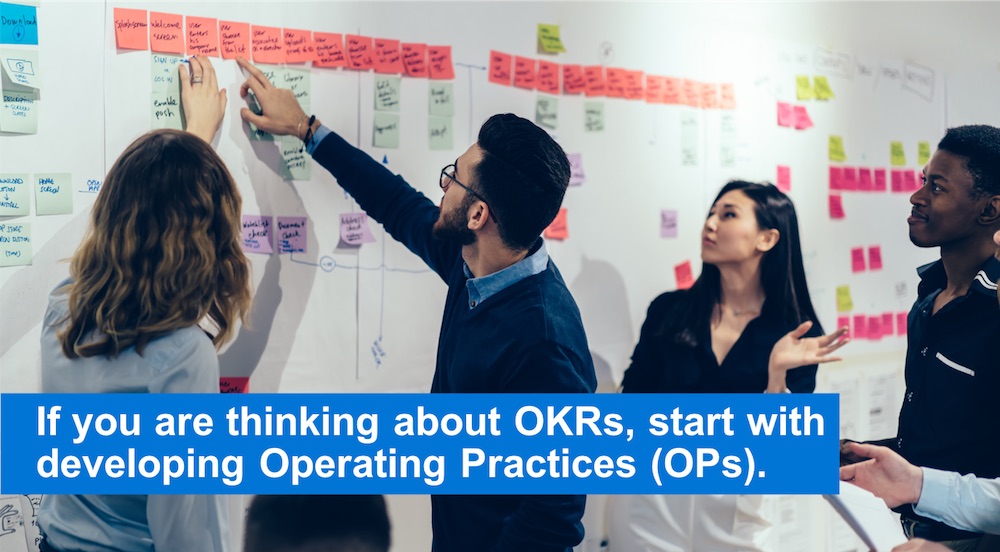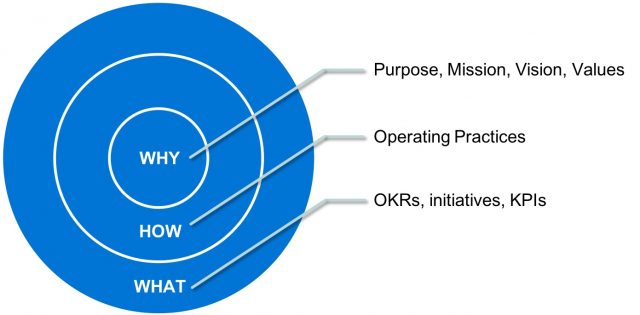
The search for better goals
In the course of digitizing their business, a lot of companies are turning to OKRs (Objectives and Key Results). The reasoning being: “If it helped Google and all those startups from the Silicon Valley, it just has to be right for us too!”
And it may very well be. It is indeed a very powerful goal-setting system that can ensure focus, alignment, aspiration and accountability.
But I have also seen a lot of companies be somewhat disappointed or outright disillusioned after having introduced OKRs to their business.
And I’d like to offer an explanation for that.
The prerequisite for OKRs
While a lot of companies claim their OKR’s helped them achieve spectacular success and growth, I think that’s actually an artifact and something else is at work here.
I’m not saying that OKRs are not useful or that you don’t need them. I’m just saying that they are not the major cause for the effect that’s attributed to them. OKRs don’t miraculously create an ambitious culture of agile disruption. It’s rather the opposite: A certain culture leads to an aggressive setting of goals which can then be aligned and focused as OKRs. OKRs are absolutely fantastic but only if they’re built on top of a certain culture.
When I say culture, I am not talking about values, by the way. Values are important but mostly not operative enough. And in most companies they are too much marketing and too little actual practice to have a major impact on daily work. It’s also all too easy to commit the fallacy of believing one has a certain culture just because one has formulated one.
Shaping culture with Operating Practices
What actually drives performance must be something different than just goals. I’d like to call that Operating Practices or short OPs.
Operating practices are very simple and concrete statements on how to operate and behave.
The most famous are probably the Ten Commandments. These are ten, easy to remember rules that guarantee the functioning of a large group.
In the animal world we have the astounding examples of large anthills or swarms of birds and how they coordinate their group without anything resembling human management tools. Something seems to be encoded in each of their DNA that helps them operate in unisan without any hierarchy.
Google’s “10x thinking”
Google has a practice they call „10x thinking“. In simple terms, they think about how they can improve what they do by a factor of 10 times, rather than by 10% like others. It challenges them to think about everything they do in terms of revolutionary change rather than evolutionary change.
The “10x thinking” is not – as many believe – the result of very aspirational OKRs but was merely encoded in them. They were striving for 10x long before they implemented OKRs. It’s in the DNA of Google, not just some byproduct of having OKRs. And that’s exactly where lots of companies go wrong when introducing OKRs. They think they get the Google DNA and Google’s ambition and everyone will then miraculously shoot for the moon. But that’s nonsense. Aspirational goals without the corresponding mindset are not only useless – they can even destroy motivation.
Apple’s “There are 1000 no’s for every yes”
Turn to Apple. Steve Jobs once said “There are 1000 no’s for every yes”. Again that’s not a goal, it’s certainly not a value, but it expresses a basic operating practice: That we will say no to a lot of ideas, concepts and iteration before we actually call something “designed by Apple” and release it to the public. That’s the strive for perfection that will ultimately wow consumers. And that’s worth more than setting specific quality standards or goals in the form of a number.
Operating practices at team level
Operating practices can comprise behavior instructions that are relevant for everyone in a company. But they can also be deployed at the team level.
In a factory, for example, an operating practice could read: “We return tools immediately to the tool bin after we’re done using them”. No ifs, no buts. This is, by the way, very different from formulating a corresponding goal like “Our tools should always be available when needed”. The goal only describes a desired state or result. The operating practice ensures that the goal is actually met even in the absence of any overt goal.
Likewise a bank branch could adhere to the operating practice of “We follow a 360°-advisory approach in every one-on-one consultation with our clients”. Most banks, however, rather try to establish goals concerning 360° advisory like “80 360°-advisory discussion per relationship manager per year”. Something that should be a mindset thus is degraded to a number that one has to hit.
How to start developing your own operating practices
So how can you come up with good operating practices for your own company?
That is clearly no easy task. You can’t just copy-paste Google’s or Apple’s. Some of the best OPs are not even documented and only live in the hearts and minds of people.
A good starting point: The purpose, mission and vision of your own company or team.

WHY does the company exist in the first place? Which aspects in your company DNA are most important to you?
You can take it from there and think about actual practices:
HOW do your best people behave and operate? What do they do and what do they consciously not do?
Also think about the future: Which behavior will be crucial? What do you need more and what less?
Start with two or three practices that capture best the mindset that you’re after.
Write them down. Talk about them. Most importantly: Live them.
Make operating practices the foundation of your goal-setting:
And then, and only then, you should think about if you are ready for OKRs.
WHAT objectives do you want to achieve? How ambitious do you want to or need you to be? Which key results will help you focus and align resources? What is your team willing and able to contribute with their own OKRs? Which initiatives and KPIs will help you manage all efforts?
Sounds like a bit of work – but well worth it!




